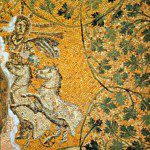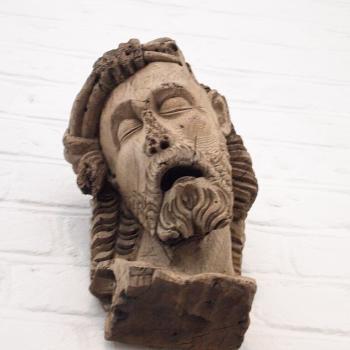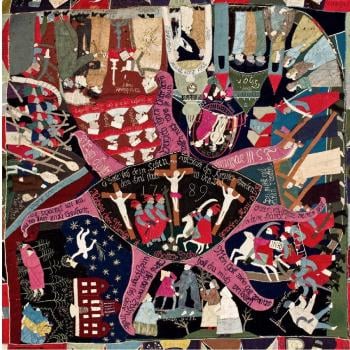![Avarice by Jacob Matham [Public domain], via Wikimedia Commons](https://wp-media.patheos.com/blogs/sites/637/2017/07/Avarice_-_Jacob_Matham-196x300.jpg)
But he who is
A greedy miser
And thinks himself
Self-sufficient,And to give the lie,
To the Best —We will indeed
Make smooth for him
The Path of Misery;Nor will his wealth
Profit him when he
Falls headlong (into the Pit).[9]
The way to hell can be paved with good intentions, but it is also paved with many ill intentions which the good intentions mask; thus, Krishna in the Gita proclaimed: “Desire, wrath and greed – this is the triple gateway to Naraka, ruinous to the self. Therefore one should abandon these three.”[10] All three, desire, wrath and greed, promote attachment to the self over charity, and so, undermine the disposition which purifies us from a multitude of sins (cf. 1 Ptr. 4:8). Charity seeks the good for the other, while the three great poisons make us attach the good to our conception of our self and the means which we use to reify and perpetuate that self. Thus, the Lord is rejected by the one who put money first in their lives:
Truly Man is
To his Lord,
Ungrateful.And to that (fact)
He bears witness
(By his deeds);And violent is he
In his love of wealth.[11]
Love of money, then, is a form of idolatry, with money ending up as a god which is put before God himself, as St. John Cassian suggested: “How is it that this sickness can so pervert a man that he ends up as an idolater? It is because he now fixes his intellect on the love, not of God, but of images of men stamped on gold.” [12]
And yet, whatever is attained, whatever wealth one accumulates, it will not last. Either one will lose much of it during their life, or in death, it will vanish as a thing of the world left behind, so that Lao Tzu was right in saying:
There may be gold and jade to fill a hall
But there is none who can keep them.
To be overbearing when one has wealth and position
Is to bring calamity upon oneself.[13]
For this reason, we should find a way to appreciate what we have, to end the endless desire of avarice:
There is no crime greater than having too many desires.
There is no disaster greater than not being content;
There is no misfortune greater than being covetous.
Hence in being content, one will always have enough.[14]
Many, if not most of us, know this already, showing once again the universal truths found in the Tao. Nonetheless, the more we live, the more temptation we will face to go against what we know is true, and the more easily we will get diverted if and when we give in to it even a little. The more we live, the more money we will likely accumulate, and the more it will become a temptation for us, for we see what it can provide in the short term. We will want to live life in ease, and money promises us such ease so long as we have it. But those who have it, often took years to get it, and now find themselves old and wealthy. Instead of being satisfied with what they acquired, and avoiding their responsibility to the world and to themselves, they should seek the truth which cannot be bought and sold, lest they become attached to the world of becoming and find themselves decaying with that world around them, their fortunes useless for them. For this reason, Confucius said that a gentleman, a wise man (or woman) will be on guard against the deceptions of wealth, which will become for some, their greatest temptation in old age:
Master K’ung said, There are three things against which a gentleman is on his guard. In his youth, before his blood and vital humours have settled down, he is on his guard against lust. Having reached his prime, when the blood and vital humours have finally hardened, he is on his guard against strife. Having reached old age, when the blood and vital humours are already decaying, he is on his guard against avarice.[15]
Of course, those of us who gain some wealth and spend it, will then find every reason to defend their expenditure and to protect their investment. Buying something that is worth a lot of money will lead us to act for its sake instead of ours, as Lao Tzu warned:
Goods hard to come by
Serve to hinder his progress.[16]
We are so easily detracted by wealth, or by what wealth provides, by the luxuries of the world. We will not progress in wisdom or in goodness so long as money and what it provides is our focus in life. It truly holds us in, imprisoning us to its dictates. “Bound by hundreds of fetters of hopes, given order to desire and anger, they strive unjustly to gather wealth for the gratification of their desires.”[17]
We must heed the Tao. The love of money is a root of evil, it is a poison which directs us away from God, and so, from our own happy end. Our greed will not only affect us but those around us, causing harm to all. We need to reject it now, and the ways in which it is placated, so we can properly continue to embrace the Tao, follow the Tao, and hopefully make it to the end of the path of the Tao where true happiness, true life, is to be found: “He who is greedy for unjust gain makes trouble for his household, but he who hates bribes will live” (Prov. 15:27 RSV). If the attainment of money was the true way, then bribery, extortion, even robbery would be justified. Yet, we must reject such methods of attaining money, even as we must not justify ourselves with our wealth: “Put no confidence in extortion, set no vain hopes on robbery; if riches increase, set not your heart on them” (Ps. 62:10 RSV).
The Tao will never proclaim wealth to be anything other than a relative good. It can help, it can be nice, but it is to be used by those who have it for the good of all. It is not to be seen as a private good which is fine to accumulate solely for oneself; it is a common good, to be measured out and given out for the benefit of all, and those who have more of it, are to be seen as stewards not possessors of that wealth. Those who are wealthy are not good because they are wealthy, nor do they deserve our honor or respect merely because they have accumulated vast amounts of money. Rather, we should look at them with concern. As long as they view money as their goal, they will reject the good expected of them, and so will bring about judgment upon themselves, not only for what they have done to gain so much money, but also for what they fail to do with it for the good of others.
[1] C.S. Lewis, The Abolition of Man (New York: Collier Books, 1955), 28-29.
[2] Salvian, “The Governance of God” in Salvian the Presbyter. trans. Jeremiah F. O’Sullivan (Washington, DC: Catholic University of America Press, 1962), 150 [quoting Pliny].
[3] Obviously, for the Christian, by following Christ along the Tao, there is the belief that Christ offers us grace, and so it must not be understood that salvation is merely a thing we do for ourselves under our own power, but rather, it is the recognition of cooperating with Christ we open ourselves to power, his grace, and so let its seed be planted in us and come to full bloom when we reach the end of the path of salvation.
[4] The Middle Length Discourses of the Buddha. trans. Bhikkhu Ñāṇamoli and Bhikkhu Bodhi (Boston: Wisdom Publications, 1995), 595 [73.4].
[5] Sri Śaṅkarācārya, Gītā Bhāṣya. trans. Dr. A.G. Krishna Warrier (Chennai: Sri Ramakrishna Math Printing Press, n.d.), 523 [XVI-17 commentary].
[6] Buddhaghosa, The Path of Purification. Trans. Bhikkhu Ñāṇamoli (Onalaska, WA: Buddhist Publication Society, 1999), 106. [III, 95]
[7] “Lobhadeva” in The Forest of Thieves and the Magic Garden: An Anthology of Medieval Jain Stories. Trans. Phyllis Granoff (London: Penguin Books, 2006), 137-8.
[8] Sri Rāmānuja, Gītā Bhāṣya. trans. Swami Adidevananda (Mylapore, Madras: Sri Ramakrishna Math Printing Press, n.d.), 514 [XVI-12 commentary].
[9] The Qurʾān. Trans. Abdullah Yusuf Ali (Brentwood, MD: Amana Corporation, 1989), 1659 [Sur. 92:8-11].
[10] Sri Rāmānuja, Gītā Bhāṣya. trans. Swami Adidevananda (Madras: Sri Ramakrishna Math Printing Press, n.d.), 519 [XVI-21].
[11] The Qurʾān, 1684-5 [Sur. 100:6-8].
[12] St. John Cassian, “On the Eight Vices” in The Philokalia: The Complete Text. Volume One. trans. G.E.H. Palmer, Philip Sherrard and Kallistos Ware (London: Faber and Faber, 1983). 79.
[13] Lao Tzu, Tao Te Ching. Trans. D. C. Lau (London: Penguin Books, 1963), 13 [IX].
[14] Lao Tzu, Tao Te Ching, 53 [XLVI].
[15] The Analects of Confucius. Trans. Arthur Waley (New York: Vintage Books, 1989), 205-6 [XVI.7].
[16] Lao Tzu, Tao Te Ching, 16 [XII].
[17] Sri Rāmānuja, Gītā Bhāṣya,514 [XVI-12].
Stay in touch! Like A Little Bit of Nothing on Facebook:
A Little Bit of Nothing













